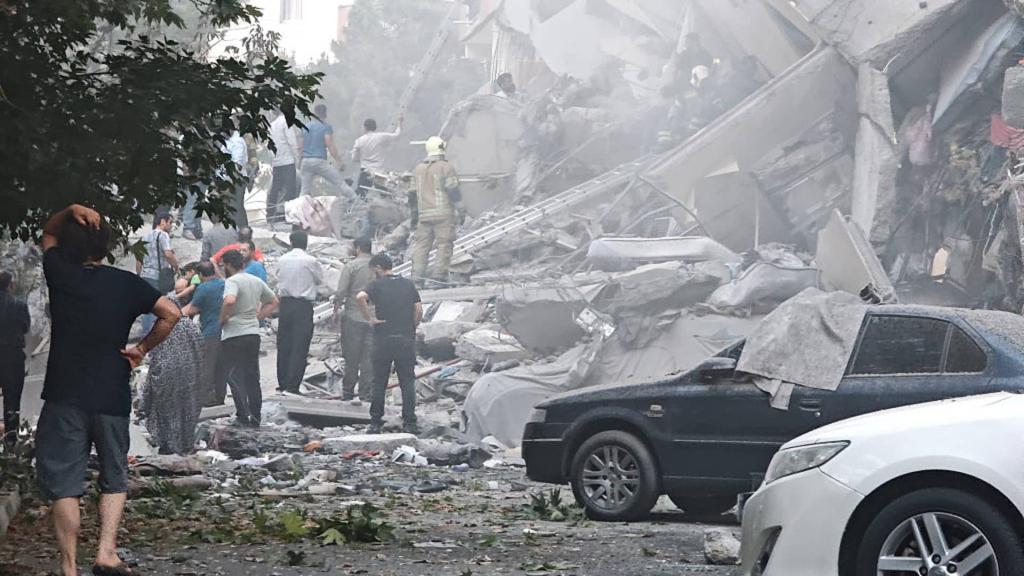International leaders have urged for restraint following a series of Israeli airstrikes on Iran early Friday morning, marking an alarming surge in regional tensions.
Israeli authorities claimed that the airstrikes specifically targeted Iran’s nuclear program, with Iranian media reporting fatalities among leading nuclear scientists and senior military personnel.
Although the United States did not participate in the attacks, President Donald Trump received advance notice of the operations.
Secretary of State Marco Rubio emphasized that the U.S. was not involved in the airstrikes, asserting that safeguarding American personnel in the area remains a top priority. The U.S. has been pursuing negotiations to establish a new nuclear agreement with Tehran and has expressed a preference for a diplomatic solution over military actions.
In response, Iran has reportedly launched approximately 100 drones aimed at Israeli territory, with the Israel Defense Forces actively working to intercept them. A state of emergency has since been declared in Israel.
The airstrikes have heightened fears of escalating hostilities, particularly in a region already grappling with ongoing instability near the conflict-riddled Gaza Strip.
‘Now is the time for restraint’
On Friday, Trump stated on his Truth Social platform that he had previously cautioned Iran regarding the strength of U.S. military capabilities, adding, “Israel has a lot of it, with much more to come – And they know how to use it.”
He urged Iran to negotiate a nuclear deal “before there is nothing left,” implying that future military actions could be more severe.
U.K. Prime Minister Keir Starmer described reports of the airstrikes as “concerning,” urging those involved to “step back and reduce tensions urgently.”
“Stability in the Middle East must be the priority, and we are engaging partners to de-escalate. Now is the time for restraint, calm, and a return to diplomacy,” he stated in a post on social media platform X.
British Foreign Minister David Lammy echoed this sentiment, declaring that further escalation posed “a serious threat to peace & stability in the region and in no one’s interest.”
French Minister for Europe and Foreign Affairs, Jean-Noël Barrot, also called for “all parties to exercise restraint and to avoid any escalation likely to compromise regional stability.” He reiterated France’s concerns regarding Iran’s nuclear ambitions and emphasized the need for diplomacy.
German Chancellor Friedrich Merz expressed similar views, stating through multiple social media posts that Germany is prepared to leverage all available diplomatic avenues. He affirmed Israel’s right to defend itself while urging restraint from both sides to prevent further regional destabilization, pointing out that the prevention of Iran’s nuclear armament should remain a priority.
In Asia, Malaysian Prime Minister Anwar Ibrahim condemned Israel’s attack, warning that such actions could further destabilize the region. He called on Israel’s allies, particularly those with influence, to exert maximum pressure to halt the aggression.
China’s foreign ministry has also backed calls for de-escalation and offered to assist in such efforts, reflecting a collective concern for regional stability.
In a statement, Russia’s foreign ministry condemned Israel’s operations, labeling unprovoked attacks against sovereign nations as “categorically unacceptable.”
A dangerous situation
European Union foreign policy chief Kaja Kallas described the Middle Eastern situation as “dangerous,” affirming that diplomacy is the most viable path forward and expressing readiness to support any diplomatic initiatives.
United Nations General-Secretary António Guterres condemned “any military escalation in the Middle East” and urged for “maximum restraint,” particularly expressing concern over Israeli attacks on Iranian nuclear facilities amid ongoing negotiations surrounding Iran’s nuclear program.
Regional reactions
Leaders across the Middle East have responded as markets brace for the potential for a wider conflict.
Saudi Arabia’s foreign ministry condemned what they termed “blatant Israeli aggressions” against Iran, claiming these actions undermine Iran’s sovereignty and violate international law.
Despite a historically tumultuous relationship between Saudi Arabia and Iran, both nations re-established ties in 2023, adding complexity to regional dynamics.
The United Arab Emirates denounced the airstrikes and expressed grave concern over escalating tensions and their implications for regional security. The UAE called for diplomatic resolutions rather than escalating confrontations and urged the United Nations Security Council to take swift action to restore peace and security.
In another statement, the Qatari foreign ministry characterized the attacks as “a blatant violation of Iran’s sovereignty and security, constituting a clear breach of international law.”
Turkey also joined the chorus of condemnation, asserting that “Israel must immediately cease its aggressive actions that could lead to broader conflicts,” reiterating its desire to avoid further bloodshed in the region.


























